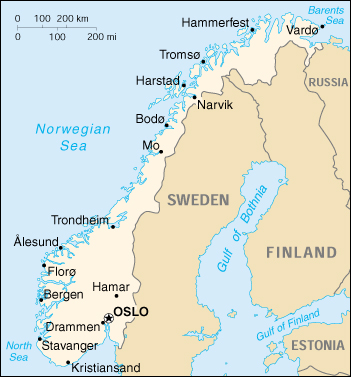
Kongeriket Norge
(Kingdom of Norway)
Despite its neutrality, Norway was not able to avoid occupation by Germany in World War II. In 1949, neutrality was abandoned and Norway became a member of NATO. Discovery of oil and gas in adjacent waters in the late 1960s boosted Norway's economic fortunes. Norway asserts a territorial claim in Antarctica (Queen Maud Land and its continental shelf); despite recent discussions, Russia and Norway continue to dispute their maritime limits in the Barents Sea and Russia's fishing rights beyond Svalbard's territorial limits within the Svalbard Treaty zone.
In referenda (held in 1972 and 1994), Norway rejected joining the EU.
Ruled by King Harald V (since 17 January 1991); Heir Apparent Crown Prince Haakon Magnus, son of the monarch (born 20 July 1973). Prime Minister Kjell Magne Bondevik (since 19 October 2001).
Capital of Norway is Oslo, and Constitution Day, 17 May is the National holiday.*

|
Location: Northern Europe, bordering the North Sea and the North Atlantic Ocean, west of Sweden.
About two-thirds mountains. Some 50,000 islands off its much indented coastline; one of most rugged and longest coastlines in the world. Norway is the only NATO member having a land boundary with Russia. The area is approximately 324,220 sq km (307,860 sq km land. 16,360 sq km water). Terrain is glaciated. Mostly high plateaus and rugged mountains broken by fertile valleys. There are small, scattered plains, but the coastline is deeply indented by fjords. To the north you will find arctic tundra. Natural hazards include rockslides and avalanches. Climate is temperate along coast, modified by the North Atlantic Current. Norway has a colder interior with increased precipitation, and colder summers causing glaciers to grow. Also, rainy year-round on west coast.
Population: About 4,546,123 people live in Norway.
The majority of residents are Norwegian (Nordic, Alpine, Baltic). Approximately 20,000 are of the Sami ethnic group. Main language spoken is Norwegian (official). Also, small Sami- and Finnish-speaking minorities.
Religious Denomination: Evangelical Lutheran (86%; state church), other Protestant and Roman Catholic (3%), other (1%), and none/unknown (10%).
Agriculture: Products include barley, other grains, potatoes, beef, milk, and fish.
Economy: The Norwegian economy is a prosperous bastion of welfare capitalism, featuring a combination of free market activity and government intervention. The government controls key areas, such as the vital petroleum sector (through large-scale state enterprises). The country is richly endowed with natural resources (petroleum, hydropower, fish, forests, and minerals) and is highly dependent on its oil production. Only Saudi Arabia exports more oil than Norway. Industries also include shipbuilding, food processing, pulp and paper products, textiles, and metals.
Currency: Norwegian krone (NOK).
*On 14 January 1814, Denmark ceded Norway to Sweden. Resisting Swedish domination, Norwegians adopted a new constitution four months later. On 14 August 1814 Norway was proclaimed independent, but in union with Sweden. However, on 7 June 1905 Norway declared the union with Sweden dissolved.

